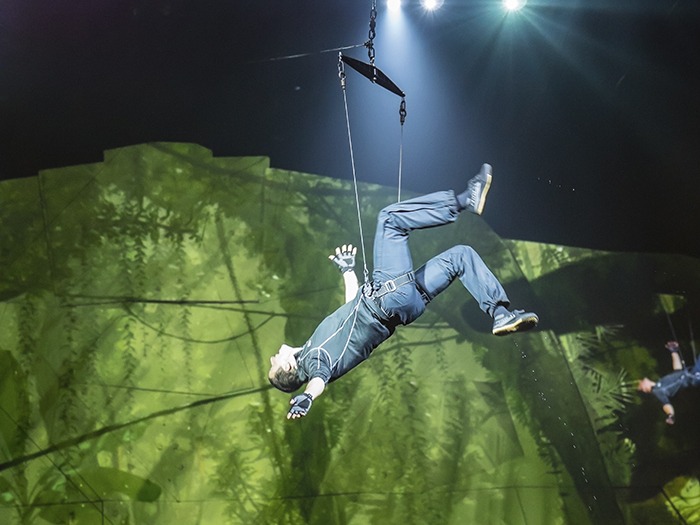It’s somewhat of an epic undertaking to install a 7:1 sound system into Wembley Arena, but that’s exactly what Britannia Row Productions (Britrow) did when Bear Grylls’ Endeavour tour began in October.
“Bear is a big presence on stage,” said the Tour Director Jim Baggott from Harvey Goldsmith’s office. “As such every member of the audience needs to feel involved and a properly implemented surround system such as this goes a long way to making that happen. Everything in the production has to come up to that standard.”
Britrow has some history in this area, “We were fortunate in that we have done something like this before,” confirmed their Project Manager, Lez Dwight, “Not least the Hans Zimmer tour last year. So I was able to assemble an experienced team. Our System Tech Sergiy Zhytnikov has done a superb job, supported by Crew Chief Josh Thomas and the rest of the crew. And the combination of Colin Pink and Fergus Mount to build and run the show has proved invaluable.”
Mount, who mixes Front of House, explained the job in detail. “It is challenging. Bear is very active and needs his wind for the physical action, so his vocal projection is relatively low. Normally that might not matter so much, after all this isn’t a show at rock concert levels. But because he transits the various PA positions, sometimes in mid-air at comparable height to the loudspeakers, getting enough gain from his mic is a battle. Wembley, as the first show of the tour, was especially hard. In rehearsals we started with a standard DPA head worn omni-directional mic but I was struggling to get clarity. Because he’s very active, sweat was a big issue; the mic boom was prone to slip. In the end we mounted two mics, one each side of his head.” (A cardioid DPA -fine and a Countryman E6.) “The weight balance between the two keeps the booms stable, and of course it means I have a back-up should the principal mic fail for any reason.”
Then there’s the aspect of a large distributed PA system. System Tech Sergiy Zhytnikov explained “We had seven areas of PA around the arena, all in different time zones. They had to behave in coherent fashion and deliver the kind of speech intelligibility that people watching his TV show are accustomed to. The L / R mains was all L-Acoustics K2, front facing hang plus side with the K1-SB subs flown alongside. Then there was what we termed the surround system which was L / R rear, and L / R side hangs of Kara. Across the front of stage, we had more Kara. Down the room were four delays (two pairs), again of Kara and then on the floor we had a sub arc of eight KS28 cabinets delayed to smooth out the LF propagation. And another pair of KS28 off to each side to fill that area.”
Besides broadcasting voice and video soundtracks, the PA system also had a sound effects role: “Having a massive thunderstorm rumble around the arena is a good example. Such effects need to be forceful and exciting but that can bring its own problems. Having a big distributed system like this allows us to put sound exactly where we wanted and gives us the chance to help Fergus at Front of House, moving the thunder elsewhere when Bear flies out in front of the main PA.”
“The show runs off a dual redundant Qlab system programmed by Colin Pink and myself. Colin was with me at rehearsals and was able to talk directly with the Composer and Sound Designers, who normally work in TV – so he was able to bridge the gap between the live and studio based creative elements of the show. Fundamentally the focus is on intelligibility, the key is to get enough vocal level from the performer so that the music can have as much impact as possible while vocals remain intelligible. Most of the show isn’t time coded, so I’m always jumping on and off comms to take cues from the show caller and listen to the show. There are a lot of cues in Qlab, around 150 in the show, that I have to trigger; I might look calm, but below the surface I’m paddling pretty hard.”
The tour is receiving great reviews, not least from Baggott himself, “It’s all great, especially when you consider the difficulty involved in making sure the voices are all clear in amongst the special effects and music. The Britannia Row crew have worked really hard to make this show sound as good as it looks.”
Mount agreed, “I must admit I was dubious about how well a surround system would work in arenas, but I’ve been really impressed with the depth and complexity that we have been able to achieve with the great system from Britrow.”


